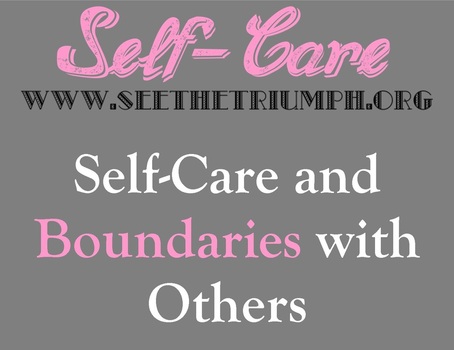|
12/11/2014 Self-Care and Boundaries with OthersBy Christine Murray, See the Triumph Co-Founder
Many aspects of self-care relate specifically to the ways a person treats him- or herself, such as journaling, using relaxation exercises, and making decision to eat nutritious food and exercise regularly. However, being able to care for oneself often also involves creating healthy boundaries in relationships with others. Establishing boundaries in relationships with others--especially close relationships--can be a daily process that may involve give rise to a number of significant challenges. From my background and training as a marriage and family therapist, I’ve come to believe that healthy boundaries are both clear and flexible, meaning that there is some clear understanding of what those boundaries look like, but they are able to be flexible enough to change when new circumstances arise. Boundaries that are too rigid or too loose can both become problematic. One of the major challenges in establishing healthy boundaries in relationships with others is that other people do not automatically respect the boundaries we attempt to create. For example, we may ask a friend to only call us before 9 p.m., but only they can choose whether to honor that request. They may still call us after 9 p.m., and if they do., we are then faced with the choice of whether or not to answer the phone call. This is a relatively simple example, but the dynamics are similar even with more significant boundary crossings. A significant boundary challenge for many survivors of abusive relationships is establishing a boundary within their relationship with their former abusers. By definition, someone who was abusive in an intimate relationship is not respectful of their former partner’s boundaries, and these boundary crossings were manifested in the power and control dynamics that occurred within the abusive relationship. Some survivors are able to fully cut ties with their former abusers. However, other survivors need to maintain some sort of contact with their former abusers, such as if they share custody or live in the same communities or share social connections. The following quotes from participants in our research demonstrate the importance of working to establish boundaries in their relationships with their former abusive partners:
The boundaries you maintain with others reflect the value you place upon yourself. You deserve to be treated with respect by others and yourself. As the above quotes from participants in our research demonstrate, deciding to commit to healthy boundaries in relationships with others is an important part of self-care. We’d love to hear from you about the ways that you’ve been able to work toward healthy boundaries in your relationships--Share your ideas by leaving a comment below! Comments are closed.
|
Archives
July 2024
CategoriesAll About Intimate Partner Violence About Intimate Partner Violence Advocacy Ambassadors Children Churches College Campuses Cultural Issues Domestic Violence Awareness Month Financial Recovery How To Help A Friend Human Rights Human-rights Immigrants International Media Overcoming Past Abuse Overcoming-past-abuse Parenting Prevention Resources For Survivors Safe Relationships Following Abuse Schools Selfcare Self-care Sexual Assault Sexuality Social Justice Social-justice Stigma Supporting Survivors Survivor Quotes Survivor-quotes Survivor Stories Teen Dating Violence Trafficking Transformative-approaches |
Search by typing & pressing enter



 RSS Feed
RSS Feed